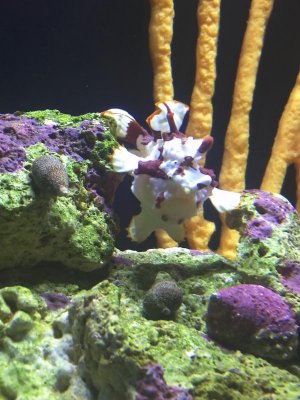So i have been reading mixed reviews.
Much of the information available is anecdotal. Mixed reviews are probably a good indicator that many experiences differ according to environmental conditions and the temperament of the individual animal. The higher the n number (sample size), the clearer the overall picture of what to expect in a particular species, but there are always outliers and probably too many variables to be precise with pedantic recommendations beyond the very general (good water quality, consistent water parameters).H
That is one of the great things about this thread... opinions vary and there are many ways to achieve a similar goal.
I understand the dangers of fatty liver from feeding fresh water feeder fish.
Fatty liver degeneration was indicated in wild collected frogfishes. I probably helped spread this notion as it is noted in a variety of '
amateur' publications.
Through observation (not examination of gut dissection) of frogfishes in the wild is that they are opportunistic feeders. As ambush predators, they don't necessarily have the dietary options available compared to an active pursuit predator (a shark can chase after the dinner of his choice; frogfishes will prey upon what makes itself available). In short, they'll eat all kinds of strange things, some better but some possibly worse than a goldfish (
Carassius auratus) et. al.
Getting to the point, from experience as a human with diabetic concerns and a general fitness interests, it makes sense to me (note the non-scientific qualifier) that a varied, marine diet somewhat approximating what a frogfish would eat in habitat would be the best for long term health and happiness.
To go on, I feed my
good frogfishes (the ones that will eat this type of food item) either rotating chunks of previously frozen halibut, smelt, anchovy, squid, clam pieces on an acrylic feeding stick. I also take the above mentioned seafood buffet, blended with selcon (or similar), agar agar, and frozen into small, little fishsticks. (note: do not come to my house for frozen margaritas. I only have one blender.)
My question is this, what real dangers am i looking at if i were to feed live, gut fed, saltwater converted, Mollies/guppies?
None... in the short term. It does behove you to 1) get real marine foodstuffs and 2) vary their diets. Variety is the spice of life.
I can and do feed frozen to all of my other fish, including my eels, so i have no problem spot feeding frozen(frogfish is currently eating frozen Krill, but wont eat anything else frozen).
Nothing wrong with krill. Fairly nutritious and marine to boot. If you can get your froggy to eat frozen krill, I would think that, eventually, you can get it to eat other frozen foodstuffs.
However, i would personally prefer to feed live once a week.
Not necessarily a better option. I had the terrible claim to fame of getting my reidi seahorses to only accept live ghost shrimp when they were raised on frozen mysis (my ex-wife might be justified using the term
idiot). I think that today's frozen options are oftentimes more nutritious compared to the starved, nutritiously-inadequate live items we raise.
Ghost shrimp and saltwater feeders outside of chromis are not available in my area, so for those types of live feeders i would be subject to ordering online which i would like to avoid if possible.
A visit to the local seafood counter might provide a variety of acceptable options. You just need to be patient and coerce your frogfish to eat off of a stick.
Also, is a moderate sized feeding once a week acceptable?
That is what I do and I have been pretty successful as of late.
I do have some frogfishes that won't eat off of an acrylic feeding stick. Mainly my little >1"
Antennatus tuberosus. They only accept f/w ghost shrimp. So I gut-load the ghost shrimp with cyclop-eez and they seem to do well.







